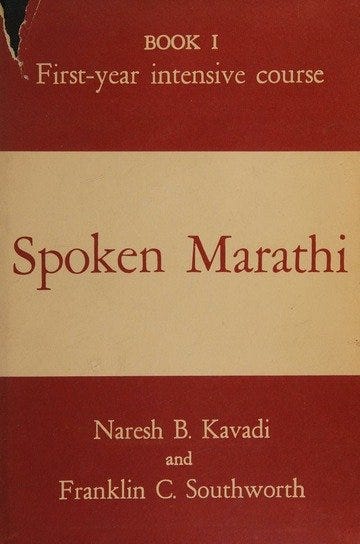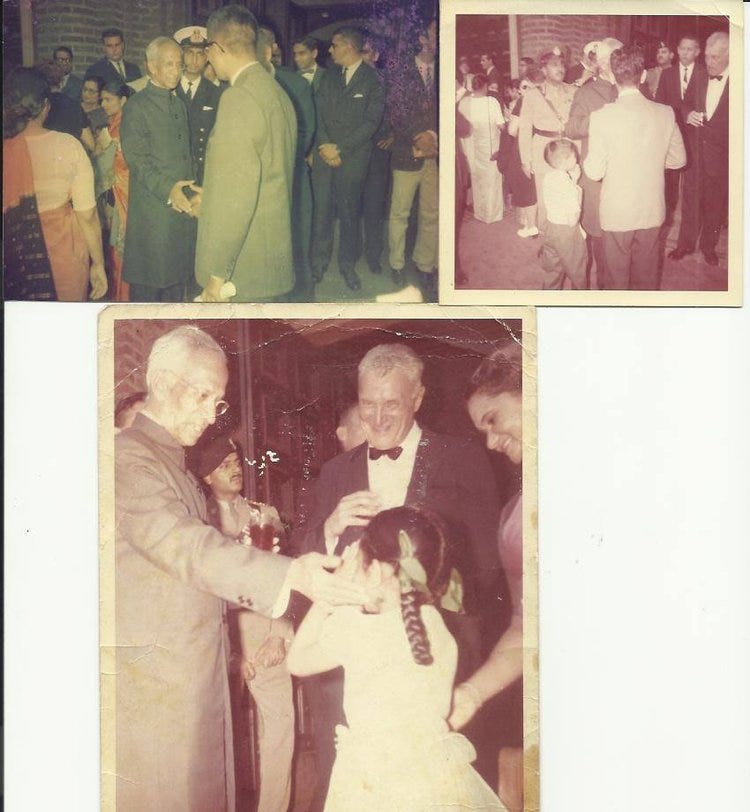My Father Taught Marathi To American Students In The 1960’s
Naresh and Kusumavati Kavadi were among the pioneers teaching Indian languages to American students says Shirish Kavadi
(Photo: Naresh Kavadi, right, with Franklin Southworth, University of Pennsylvania, 1961.)
July 30, 2024
By Shirish N Kavadi*
In 1965, the University of Pennsylvania (U Penn) published Spoken Marathi Book 1. First Year Intensive Course, a reader co-written by my father Naresh B Kavadi (1922-2000) and Franklin C Southworth, (1929—present). Marathi is the official language in Maharashtra, whose capital is Mumbai, and is spoken by most of the state’s 124 million people.
The 252 page book, which continues to be used at U Penn and other universities, is among the earliest readers in an Indian language to be published by an American university. The U Penn Marathi reader had a second print in 1968 and a third one in 2016.
Interest in Indology and Sanskrit at U.S. universities has a long history. At U Penn, for instance, the study of Sanskrit began in 1890, with the first full time faculty in the language appointed in 1912. Following the end of World War 11, South Asian studies at U.S. universities received a boost in funding from the U.S. government as well as from private foundations.
In 1926, W. Norman Brown (1892-1975) was named Chair of Sanskrit at U Penn. Over the next thirty years, Brown “profoundly changed the study of South Asia in the United States,” notes the U Penn South Asia Studies website.
Since 1919, the Rockefeller Foundation operated a public health program in India. In the 1950s, it diversified its philanthropic support to other areas, including South Asia studies and the promotion and development of South Asian linguistics. An important factor in this decision was the cold war between the U.S. and the Soviet Union. After the U.S., India received the largest funding from the foundation.
In 1954, the foundation funded a linguistics training program at Deccan College, Pune. Southworth, who had earned a PhD in linguistics from Yale University, received a Rockefeller fellowship to study Marathi, Hindi and Tamil. He arrived in Pune in 1958 with his then wife Jose, daughters Michele and Suzy. My father was assigned the responsibility of teaching him Marathi.
In the same year, the U.S. Congress passed the National Defense Education Act (NDEA) under which federal funding was awarded to university foreign language centers, including at U Penn. In the early 1960s, the University of Chicago published introductory readers for Bengali, Hindi, Urdu, and Tamil.
In 1959, Southworth was appointed by U Penn as an Assistant Professor of Linguistics and Indian Languages. He arranged with the university for my father to join him in preparing a Marathi reader and a dictionary. These projects were supported with funding provided under the NDEA.
My father was among the early Indian scholars to be associated with the South Asia program at U Penn, from 1960 to 1965. Around the same time, Tamil was taught at the university by S. Vaidyanathan.
In June 1960 my father flew to Philadelphia. The appointment, which was initially for a year, was renewed. U Penn paid travel costs for only spouse and two children. In the summer of 1962, my mother, younger sister Shubha, age 6, and me, age 7, joined him. My older siblings Sharad and Shamala were in Marathi language high schools. They stayed back in Solapur, living with my maternal uncles and aunt.
We lived in an apartment at the corner of 40th and Walnut Streets, opposite the Walnut Street branch of the Free Library of Philadelphia. In the 1970s the apartment building in which we lived gave way to a McDonalds and is currently being replaced by a new structure. My mother took free English language classes conducted at the library for non-English speaking foreigners. Shubha and I enrolled at the Henry C Lea School on 47th and Locust Streets.
At U Penn, Southworth and my father, assisted by my mother, worked on a Marathi -English dictionary. Ashok Kelkar, Professor of Linguistics at Deccan College, Pune, was also briefly engaged with the work. For various reasons the project remained incomplete and was eventually shelved.
My mother also shared responsibility at U Penn for conducting Marathi language classes as a “Native Speaker”. She helped graduate students, working on doctoral dissertations on Maharashtra, to converse and read Marathi texts.
Her notable students included the late Eleanor Zelliot (1926-2016), a renowned scholar of B R. Ambedkar and the dalit movement in Maharashtra, who later taught at Carleton College in the U.S.; Mary C. Carras, who studied the factional politics and district councils in Maharashtra and taught at Rutgers University, U.S.; and, Maxine Berntsen, who had earlier spent two years as a college teacher in Hyderabad, India.
Berntsen’s doctoral dissertation on social variation in the Marathi speech of Phaltan, a town in Western Maharashtra, was supervised by William Labov of Columbia University, Franklin Southworth, Dell Hymes, and Richard Lambert, Professor of Sociology at U Penn. Later Berntsen moved to Phaltan and set up a school for the underprivileged. She became an Indian citizen in 1973. Zelliot, Carras and Berntsen were frequent visitors at our apartment in Philadelphia. Berntsen would stay overnight with us on many weekends practicing her Marathi, while teaching my mother English.
(Photo: Kavadi family, Empire State Building, New York, 1963.)
The Kavadi family hailed from the Junnar region of Pune district but had settled in Solapur (then Sholapur), both in Maharashtra state, where my father was born on August 5 1922. My grandfather Bhikaji L Kavadi was a lawyer, involved in the freedom struggle against the British rulers, an official of the Indian National Congress Party, which led the struggle, and active in Solapur’s public life.
My father had his schooling in Solapur and received his BA and MA degrees in Marathi and English literature from Bombay (now Mumbai) University. He also studied law at the Indian Law Society College in Pune but gave it up after a year. He taught at Seva Sadan Girls High School and, also briefly, at the DAV College, both in Solapur.
My parents married in 1946. In 1951, my father received a University Grants Commission research fellowship to undertake doctoral research at the newly founded University of Poona (now Savitribai Phule Pune University) under the supervision of S. G. Tulpule. His thesis, written in English, was titled “Folk Songs from Dang: A Linguistic Study.” The Dangs are a tribe in the Dang region of Gujarat state, near the border with Maharashtra. Their dialect bears influence of both Marathi and Gujarati languages. My father earned his PhD in 1954, with his thesis winning the best thesis award from the university.
My mother Kusumavati (nee Kusum Jahagirdar) belonged to a family of Jahagirdars (landlords) from a village named Begumpur on the banks of the river Bhima in Solapur district. She was a high school graduate and a home maker but was well read in Marathi literature. Until she came to the U.S., she spoke very little English.
In the early years of Poona University, the Marathi Department had only one teaching post held by Tulpule. From 1954 to 1957, my father was in New Delhi working as a newsreader in Marathi for All India Radio, the government-owned radio network which then had a monopoly across India.
In 1957, he returned to the University of Poona as a Research Associate. This was a turning point in his life since there he met Southworth, then worked at U Penn, and co-wrote the Marathi reader.
In 1965, my father’s contract at U Penn came to an end. My parents were on visitor exchange visas and were required to return to India. My father stayed in the U.S. till the end of 1965 teaching Marathi to a batch of Peace Corps volunteers at Brattleboro, Vermont.
My parents gave up plans of returning to the U.S. owing to changes in funding for South Asia studies and domestic compulsions. On their return to India, my mother went back to being a homemaker.
My father initially taught in Solapur. In 1970 he was invited by the well-known Marathi poet P. S. Rege (1910-1978), the head of Chowgule College, Margao, Goa, to join the Marathi Department. Rege’s poems have been translated into English by Philip Engblom who taught Marathi at the University of Chicago.
My family moved to Margao. My father retired from the college in 1982. After his retirement, my parents lived in Margao, Mumbai, and Pune.
During his literary journey, which began in his twenties and spanned roughly 50 years, my father initially wrote poetry but gave it up. He wrote several short stories in Marathi, under his first name Naresh, which were published in Satyakatha, Mouj, and other prestigious Marathi journals. His stories were translated into Hindi and English; a couple of them were translated into English by Berntsen.
The stories were published as two collections. One of them, titled Beerchi Sah Cans (Six Cans of Beer), was published by Mouj Prakashan. The title story is set in Philadelphia though the city is not named. The book won the Maharashtra State Award for literature. Several of his other books also won the Maharashtra State and the Goa Kala Akademi awards for literature.
In addition, my father published a collection of Marathi folk songs from Solapur district titled Bharli Chandrabhaga. His other writings included: a biography of Morarji Desai, the former Prime Minister of India; literary criticism, which appeared in a book of essays; and columns in Marathi for Gomantak, a Goan daily published from Panaji, Goa, and Lalit, a literary magazine, published from Mumbai.
He translated books from English, Hindi and Konkani into Marathi, including Voltaire’s Candide and the Hindi autobiography of Rajendra Prasad, the first President of independent India. His translation of Damodar Mauzo’s Karmelin won the 1992 translation award given by the national Sahitya Akademi, New Delhi.
My father was a regular guest on All India Radio, Goa. He gave talks, wrote radio plays and took part in some of the plays. He was invited to speak at public functions in Solapur and other towns in Maharashtra as well as in Goa.
On April 4, 2000, my father passed away, at age 78, in Pune. My mother had predeceased him in June 1994. The U Penn reader Spoken Marathi may have earned my father a certain recognition in South Asian studies at American Universities but my mother’s contribution to teaching Marathi to American students was just as important.
(Photo: Indian president S. Radhakrishan visitng University of Pennsylvania, Philadelphia, 1963. With Shirish Kavadi, top right and Shubha Kavadi, bottom.)
* Shirish N Kavadi, is a medical historian and health policy researcher based in Pune, Maharashtra, India. Earlier he taught Political Science at Patkar and other colleges in Mumbai University (1980-1988) and SNDT University, Mumbai, (1988-1992). In 2011, he earned his PhD in history from Mumbai University.





